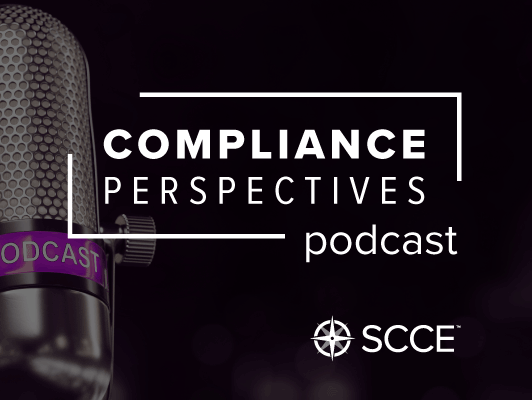Podcast: Play in new window | Download (Duration: 15:19 — 14.1MB)
Subscribe: Apple Podcasts | Email | TuneIn | RSS
NOTE: This podcast was recorded prior to the conversion of the Compliance & Ethics Institute to a virtual program. Some of the sessions and their tracks may have changed. Be sure to visit the website to see the latest agenda.
While travel is much more difficult these days, you can still span the globe of compliance issues at the 2020 Compliance & Ethics Institute (CEI).
Brazil-based Shin Jae Kim (SCCE/HCCA Board Member and Partner at TozziniFreire Advogados) and UK-based Jonathan Armstrong (partner at Cordery) serve as chairs of the Multi-National/International Track at the CEI and explain that their aim was to be truly international and to look at the heart of what’s concerning compliance professionals around the world.
Session on the agenda include:
- The Practical Who, What, When, Why and Hows of Third-Party Risk Assessment and Due Diligence
- Latin America: How to Survive Doing Business in our Region
- Building an International Speak-Up and Compliance Culture
- How to Conduct Independent Investigations on Foreign Operations
- Asia, State of the Union: Compliance Relations in Asia
In this podcast we address what’s on the agenda at the CEI as well as what’s going on now for global compliance programs. Current issues include dramatic shifts in supply chains, finding alternatives to face-to-face training, replicating in-office controls when people are at home, and avoiding corrupt payments while sourcing PPE in a hurry.
Listen in to get the latest on multi-national/international compliance challenges. Then join us for the 2020 Compliance & Ethics Institute.



Africa’s digital revolution is well underway and progressing being driven mainly through the adoption and application of BLOCKCHAIN technology ( a distributed ledger without intermediaries and with near instant updates).. This technology is quickly gaining traction and permeating all sectors of the African society such as Education, Health, Trade and Commerce, Media and Telecommunication, Banking and Finance etc.. A notable application and embodiment of this technology is the construction and installation of the African Continental Free Trade Agreement ( AfCFTA) secretariat in Accra Ghana, which is believed to be the biggest free trade area in the world in terms spatial size and population. However more remains to be done technologically for the infrastructure to be fully operational. For instance there has to be the creation of an online discussion forum ( social media platform) to spearhead the successful implementation of the agreement, creation of the AFCFTA mobile APP to be used for the sale and purchase of goods and services under the agreement, creation of a Dashboard for African Union (AU) trade observatory team to take inventory and track the progress of the agreement., creation of a Pan – African payment and settlement system platform to ensure a cost effective and easy payment for goods and services, this platform could also be pivotal to the single currency adoption agenda by the ECOWAS member countries if implemented and also the creation of a digital platform for monitoring and elimination of non- Tariff barriers which could mainly be in the form of a digital delivery system or a package delivery system for the prompt and safe delivery of goods and services purchased under the agreement.. With the continuous support and expertise of my impeccable, outstanding and amazing international investors, business partners and associates Africa’s digital and technological global competitiveness will be hugely elevated and improved.
The REFINITIV MATCHING PLATFORM is one example of block chain technology in Ghana’s banking and finance sector , it is a real time online platform developed in collaboration with the central bank ( BANK OF GHANA) for bulk foreign exchange trading activities. It’s real time functionality will enable traders to view rates and exchanges instantaneously it also eliminates the need for intermediaries or third party traders since trading is done directly with the central bank and at the face value thus eliminating unnecessary costs and losses associated with forex trading stemming from unjustifiable rate hikes by the third parties. Trading on this platform and at the face value will also help to enforce Ghana’s currency act of 1964 ( Act 242) which makes it an offence for individuals or businesses to trade at rates far exceeding the face value or rates that falls below it. It will also help to uphold the central bank’s mandate as enshrined in article 183 section 1 ( Article 183 (1) ) of Ghana’s 1992 constitution and section 35 of bank of Ghana’s act ACT 2002 ( Act 612) as amended which designates the central bank of Ghana as the sole institution with the power or authority to issue or redeem the Ghana CEDI ( NOTES AND COINS ). Another important benefit of trading on this platform is that it will help tackle a daunting economic and financial challenge faced by most developing economies including Ghana which is the issue of inflation and currency depreciation which could be partly attributable to unjustifiable rate hikes by intermediary or third party forex traders. The NOBILE MONEY INTEROPERABILITY PLATFORM is another example of this technology ( BLOCKCHAIN) in Ghana’s financial sector developed in collaboration with the Ghana Interbank Payment and Settlement System which enable seamless and direct transfer of funds from one mobile network to another mobile network or into bank accounts. Ghana is the first and only African country to launch this payment system, however what urgently remains to be done to improve upon this platform is for the telecom companies and the government through the ministry of communications to increase, extend and upgrade the fiber networks to fully power, activate and liberalize the use of this platform to enable clients to perform transactions on their own smartphones and mobile devices without relying on vendors and financial institutions , this will enhance the security and efficiency of this platform as well as pave the way for other payment technologies such as the unstructured supplementary services data ( USSD) in the retail and electronic commerce sector . This will then light up the government ‘s agenda of digitizing the economy and help achieve the sustainable development goal of financial inclusion.
Comments are closed.